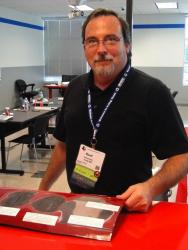September 19, 2013 - High School Instructors Go Back to School
 |
Kurt Schurman went back to school to learn about the advancements in the auto and diesel fields. |
The vehicles of today are marvels of technical ingenuity. Rear-mounted radar. Night vision with pedestrian detection. Automatic high-beam control. Every day there are advances in technology that make vehicles safer and more comfortable for occupants.
Today’s automotive and diesel technicians are highly skilled workers who excel at diagnostics and work with advanced computer systems. This has led to a great change in the curriculum of high school shop classes. Students are spending less time turning wrenches and more time learning math and critical thinking skills needed to work with the sophisticated systems that power our cars and trucks.
Now, more than ever, continuing education classes for high school instructors are crucial to helping them stay on top of advancements in the field. Recently, Universal Technical Institute-Dallas/Fort Worth (www.uti.edu/dfw) hosted members of the Texas Industrial Vocational Association (www.tiva.org), for an intensive continuing education program. The group of 58 high school auto and diesel instructors came from across Texas to learn about the latest cutting-edge auto and diesel technology and how to advance their students’ knowledge.
For Kurt Schurman, an automotive instructor at Ratteree Career Development Center (www.irvingisd.net/ratteree), a school in the Irving Independent School District (ISD), it was a chance to not only see the school that many of his former students have attended, but to learn about advancements in the auto/diesel field.
“It’s important for teachers in this industry to be constantly learning so we can teach our students this technology that has become quite advanced,” said Schurman. “I think there’s always something new to learn.”
During a day-long class on collision repair, Schurman and his fellow instructors were introduced to the managerial concept of Lean Six Sigma, which improves efficiencies and outcomes by eliminating waste and unnecessary processes. They also attended an I-CAR plastics repair workshop where they learned about the most up-to-date products used to accomplish repairs to ensure quality and safety, how to tune air fuel ratios safely and how to choose the correct injector for the amount of horsepower.
“I’ve learned a lot about how to streamline and enhance the program, and I can take this back to my classroom so our students are well-prepared for the future,” he said.
To learn more about Universal Technical Institute-Dallas/Fort Worth, visit www.uti.edu/DFW.




